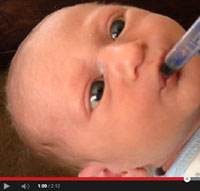The Cause and Treatment of Infant Hiccups in Babies and Newborns
Everyone is familiar with hiccups. We all experience them from time to time, less and less often as we grow older. Babies are particularly prone to hiccups, even within the womb, sometimes as early as the 6th week after conception. But hiccups are usually nothing to worry about. They may last for a minute or up to an hour but do the baby no harm – in fact some infants seem amused by the surprise caused. Baby’s hiccups are just one of those normal behaviors and reflexes that parents need to know about but not be alarmed by. Hiccups are most likely to occur just after a feed or when the child gets excited. As a newborn’s internal organs develop and mature, hiccups should diminish in intensity and frequency.
Why do babies get hiccups? Hiccups have nothing to do with breathing. They are caused by sudden contractions of the diaphragm triggered by irritation or stimulation of that muscle. Some leading pediatricians are of the opinion that infant hiccups are usually caused by feeding (breast, formula or other foods) or by a drop in temperature that causes the baby to get cold. Hiccups are considered harmless unless they prove persistent enough to interfere with regular feeding and sleeping. Babies with gastroesophageal reflux disease (GERD) may tend to hiccup more frequently, accompanied by spitting up, coughing and irritability. Such behavior should be mentioned to your medical advisor as should very frequent bouts of uncontrollable hiccups, particularly after age 1. Although baby hiccups are seldom the sign of a more serious underlying medical condition, it never does any harm to be cautious.
How to bring a bout of baby hiccups to an end? Old wives tales and ethnic cultural traditions offer a whole lot of methods that go back centuries. Causing a sudden unexpected shock by bursting an inflated paper bag or dropping a cold key down the sufferer’s back are just part of popular folk law. Certainly slapping a baby on the back or roughly handling them in any way is never advisable. But a gentle back rub, a sip of water or giving something to suck on, may just do the trick. Hiccups usually bother a parent more than the child, although they may cause distress to the baby during feeding. Changing the child’s position and trying get them to burp or relax may help.
If the newborns hiccups don’t go away on their own within five to ten minutes, a few drops of a natural cure such as Colic Calm gripe water should bring things to a halt. If the baby gets hiccups often, always try to feed when the infant is calm and before they get extremely hungry. This should reduce the chances of hiccups occurring during feeding. Try to make feeding as calm, quiet and leisurely a process as possible with the minimum of external distractions for the child. If hiccups do occur during feeding, stop feeding and give them a chance to go away. Burping the baby can also help. As a baby develops so the incidence of hiccups should recede and become just one more of those behaviors that babies grow out of.
 Canada
Canada South Africa
South Africa UK
UK EU & Int
EU & Int Ireland
Ireland Australia
Australia Brazil
Brazil New Zealand
New Zealand
